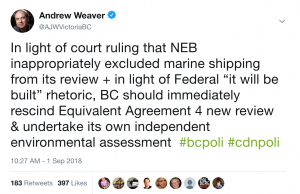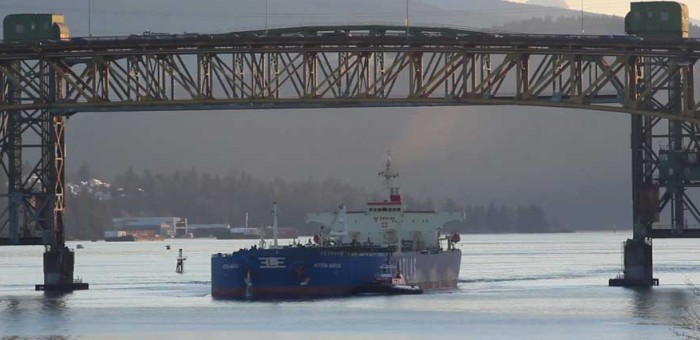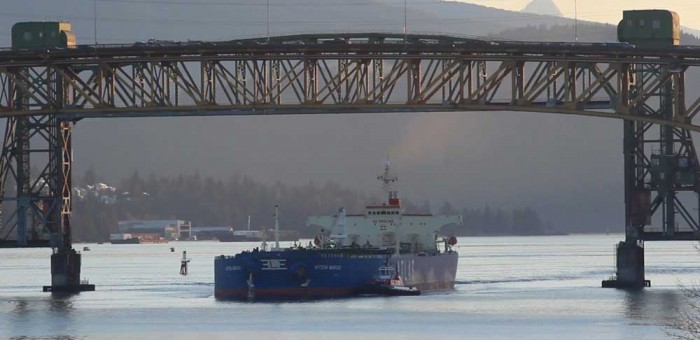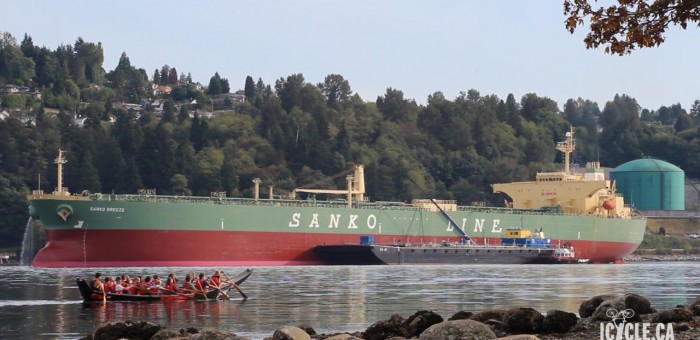Kinder Morgan
Will the BC Government withdraw from the equivalency agreement on the Trans Mountain project?
In the 2017 election the BC NDP campaigned on using every tool in the tool box to stop the the Transmountain pipeline project. Earlier this month I noted that the Federal Court of Appeal presented them with a very powerful tool.
Given that the provincial cabinet’s approval of the Transmountain project relied on the same NEB report as the federal approval, and in light of the recent Federal Court of Appeal’s ruling that the report was “impermissibly flawed”, the BC Government has the opportunity to pull out of the Equivalency Agreement and conduct its own, independent environmental assessment.
Today in Question Period I quizzed the Minister of Environment as to whether or not he will initiate a withdrawal from the equivalency agreement. Below I reproduce the video and text of our exchange.
Video of Exchange
Question
A. Weaver: On August 30, the Federal Court of Appeal quashed the federal cabinet approval of the Trans Mountain project. The court cited: “The board’s process and finding were so flawed that the Governor-in-Council could not reasonably rely on the board’s report. Second, the government of Canada failed to fulfil the legal duty to consult Indigenous peoples.” In particular, the court noted: “The board unjustifiably defined the scope of the project under review not to include project-related tanker traffic.”
The B.C. NDP campaigned on using every tool in the toolbox to stop the project from going forward. My question to the Minister of Environment is this. In light of the fact that the court ruled that the NEB process was flawed, my question is: will he use his authority to pull out of the equivalency agreement with Ottawa on the environmental assessment of this project for the next 22 weeks?
Answer
Hon. G. Heyman: Thank you to the Leader of the Third Party for the question. I think this is a good opportunity to just take a brief look at history. There was a time when the official opposition, then in government, expressed concern about the impacts of diluted bitumen on our coast, expressed concern about failings that they perceived in the National Energy Board process, but as that process rolled on, the official opposition simply rolled over and accepted the conclusions of the National Energy Board.
But that wasn’t all. First Nations on the coast expressed concern as to their rights, their culture, their traditional economy. Thousands of British Columbians expressed concern about our environment, tens of thousands of jobs that were at risk, and this government stood up with them and expressed the same concerns. And what did the opposition say when we did that? They said that there was a decision, the project was going ahead, and we should simply accept it.
The decision of the Federal Court of Appeal is significant and far-reaching for a number of reasons, but not the least of which is it validated the concerns of First Nations, it validated the concerns of British Columbians about our coast, and it validated the actions of our government in standing up for our coast, and that’s what we will continue to do.
Supplementary Question
A. Weaver: I do recall, when I sat in opposition with my colleagues from the B.C. NDP — at a time when I heard them calling on the government of the day to actually withdraw from the equivalency agreement over the same concerns that I share today.
Our Prime Minister has signaled that the NEB has precisely 22 weeks on which to reassess the available information. That’s over Christmas. Interveners have to have given notice within the next couple of days if they want to participate.
It’s clear to me and those who participated as interveners in the prior assessment that the decision has already been made. How is it possible that the British Columbia government can have faith in a process where the decision is clearly made and where a prime minister has reiterated, time and time again, it will be built?
Again, to the Environment Minister: will he stand up for the interests of British Columbians and give the federal government the required 30 days’ notice to withdraw from the equivalency agreement today?
Answer
Hon. G. Heyman: Again, thank you to the Leader of the Third Party, who raises some very significant points about the process that is underway. The decision of the federal court was complex. It’s far-reaching. We are reviewing it with both internal and external legal advice.
The federal government’s announcement about how they intend to proceed with the NEB now gives us an important context within which to assess our options going forward. We are well aware of the impending deadline. We are preparing our action in response to that deadline. But more importantly, we are preparing a range of options that are thorough, they’re well considered…. But I can assure the Leader of the Third Party this: we will defend our environment. We will defend our coast. And we will defend the tens of thousands of British Columbian jobs that depend on it.
Terms of new environmental review of Trans Mountain a concern
Today the Federal government announced its path forward on the Trans Mountain Pipeline expansion project. In response, my office issued the media release reproduced below.
Media Release
Weaver: Terms of new environmental review of Trans Mountain a concern
For immediate release
September 21, 2018
VICTORIA, B.C. – Andrew Weaver, leader of the B.C. Green party, is raising concerns about the federal government’s approach to reviewing the Trans Mountain pipeline project. Earlier this month, the Federal Court of Appeal quashed the federal government’s approval due to the flawed NEB process.
“This process must be clear from political control and therefore needs to be free from a politically-imposed timeline,” said Weaver.
“Any process that is about getting to ‘yes’ will inevitably fail to protect the public interest. Environmental assessments must be objective and evidence-based. And meaningful consultation with Indigenous people must ensure they are approached as partners, not as barriers to be overcome on the way to a predetermined approval.
“The federal approval of this project was always political. The Prime Minister campaigned to subject all new projects to a revised NEB process, yet pushed Trans Mountain through the old broken one. Meanwhile, additional conditions were imposed on Energy East to ensure the project was assessed through the critical lense of climate change. Why would those same considerations not matter in the case of a pipeline through B.C.? There is no reason for B.C. to shoulder such significant risk simply to fulfill political agendas.
“Both colleague Adam Olsen and I were interveners in the original NEB hearings, focusing on the consequences of a marine spill and on Indigenous rights. We are exploring whether we have rights to intervene in the new hearings.
“We are also sitting down with the provincial government to ensure that they are using all legally available means, including terminating the equivalency agreement signed by the previous administration, to protect our coast from a catastrophic diluted bitumen spill.”
-30-
Media contact
Jillian Oliver, Press Secretary
+1 778-650-0597 | jillian.oliver@leg.bc.ca
On the need for a made-in-B.C. environmental assessment of the Trans Mountain expansion project
Last week, the Federal Appeal Court ruling revealed that politics was put ahead of evidence and reconciliation in the federal cabinet approval of the Transmountain pipeline project. My colleague Adam Olsen, MLA for Saanich North and the Islands and I both feel vindicated after many years serving as intervenors in the NEB process. The reasons cited in the Federal Court of Appeal ruling validated the key aspects of our arguments during the intervention process.
This presents an opportunity for the BC Government to step in and stand up for the protection of our coast.
On January 11, 2017, then Premier Christy Clark announced that her government’s five conditions had been been met. The Transmountain Pipeline project was given the green light.
Reacting to the announcement, John Horgan said he planned to “use every tool in our tool box” to stop the project. Indeed, these same words are embedded in our confidence and supply agreement:
“Immediately employ every tool available to the new government to stop the expansion of the Kinder Morgan pipeline“
 Well the BC Government has now been granted the ultimate tool. Given that the provincial cabinet’s approval of the project relied on the same NEB report, and in light of the Federal Court of Appeal’s ruling that the report was “impermissibly flawed”, the BC Government has the opportunity to pull out of the Equivalency Agreement and conduct its own, independent environmental assessment.
Well the BC Government has now been granted the ultimate tool. Given that the provincial cabinet’s approval of the project relied on the same NEB report, and in light of the Federal Court of Appeal’s ruling that the report was “impermissibly flawed”, the BC Government has the opportunity to pull out of the Equivalency Agreement and conduct its own, independent environmental assessment.
This is particularly important in light of the “it will be built” rhetoric emanating from the Trudeau government. How can British Columbians trust an environmental assessment process when the final answer has already been prescribed? The answer is simple, it can’t.
Below is the media statement that we released yesterday on this topic. There is an excellent contextual analysis of the issue in ‘s article that was published yesterday in the Star Vancouver.
Rest assured, the BC Green Caucus will closely monitor government’s response to our call. We don’t see any compelling reason not to pull out of the equivalency agreement in light of the fact that it is such an important tool now available in the so-called BC NDP toolbox.
Media Release
Andrew Weaver statement on the need for a made-in-B.C. environmental assessment of the Trans Mountain expansion project
For immediate release
6 September 2018
VICTORIA, B.C. – Today Andrew Weaver urged the Province to undertake its own made-in-B.C. environmental assessment of the Trans Mountain pipeline.
“It is clear that B.C. cannot rely on the Federal government to protect our environment from the risks of this project”, said Andrew Weaver, Leader of the B.C. Green Party.
“The Federal Court of Appeal has ruled that there were ‘successive, unacceptable deficiencies’ in the NEB report. As a result, they found that the NEB’s report and recommendations could not be relied upon to make a decision in the public interest.
“Yet the Federal government insists that they will get this pipeline built. This rhetoric shows that they have already determined the outcome, and that they are in a rush to build this pipeline. As a result, it is clear that we cannot trust the Federal government to proceed in an objective and unbiased manner.”
The previous provincial government signed an equivalency agreement with the NEB in 2010, which meant that B.C. relied upon the NEB report in issuing its environmental certificate for the Trans Mountain expansion.
“B.C. needs to be in control of our own environmental review process, to make sure it is objective and evidence-based”, said Weaver. “The provincial government should terminate the equivalency agreement signed by the previous administration. Now is the time to use the tools at our disposal to ensure our environment is protected from the risks of an oil spill.”
-30-
Media contact
Sarah Miller, Acting Press Secretary
+1 250-858-9891 | sarah.miller@leg.bc.ca
Federal Court Ruling show politics put ahead of evidence and reconciliation in federal approval of pipeline
Today the Federal Court of Appeal released its decision on the long awaited Tsleil-Waututh Nation v. Canada (Attorney General) court case. In what should be the final death knell for the project, the Federal Court of appeal ruled that:
- The Board unjustifiably defined the scope of the project under review not to include project-related tanker traffic. This exclusion permitted the Board to conclude that, notwithstanding its conclusion that the operation of project-related marine vessels is likely to result in significant adverse effects to the Southern resident killer whale, the project was not likely to cause significant adverse environmental effects. The unjustified exclusion of project-related marine shipping from the definition of the project rendered the Board’s report impermissibly flawed: the report did not give the Governor in Council the information and assessments it needed in order to properly assess the public interest, including the project’s environmental effects—matters it was legally obligated to assess.
-
The Government of Canada was required to engage in a considered, meaningful two-way dialogue. However, for the most part, Canada’s representatives limited their mandate to listening to and recording the concerns of the Indigenous applicants and then transmitting those concerns to the decision-makers. On the whole, the record does not disclose responsive, considered and meaningful dialogue coming back from Canada in response to the concerns expressed by the Indigenous applicants. The law requires Canada to do more than receive and record concerns and complaints…The duty to consult was not adequately discharged.
The result is that the soon-to-be-taxpayer-owned project must redo “phase 3” of the consultation process and send the project back to the newly-constituted NEB process for a reassessment of the effects of increases in marine shipping.
As readers might imagine, I am delighted by the decision. My colleague Adam Olsen, MLA for Saanich North and the Islands and I both feel vindicated after many years serving as intervenors in the NEB process. We are grateful to the Tsleil-Waututh, Squamish, Coldwater, Secwepemec and other First Nations, along with the cities of Burnaby and Vancouver, for their efforts to ensure that the appropriate evidence was brought before the Federal Court of Appeal. We should not forget that the resources that could have been put to use in their communities were instead directed to the legal challenge.
The decision today is both a victory for science and evidence-based decision-making (ruling 1. above) as well as a victory for indigenous rights (ruling 2.). As the only sitting MLA to seek intervention status, my focus as an intervenor was almost exclusively on the former, culminating in an Open Letter to Prime Minister Trudeau in November, 2016.
I  was very disappointed by the petty response of Rachael Notley to the decision. As I summarized in a tweet earlier tonight:
was very disappointed by the petty response of Rachael Notley to the decision. As I summarized in a tweet earlier tonight:
It’s time to stop playing politics with younger generations’ future. The fed gov needs to show real climate leadership with a plan to meet our targets that doesn’t rely on selling out First Nations’ rights, the coast & the economic activity our communities depend on.
In response to the ruling, my office issues a media release which is reproduced below.
Media Release
Weaver: Federal Court Ruling show politics put ahead of evidence and reconciliation in federal approval of pipeline
For Immediate Release
August 30, 2018
VICTORIA, B.C. – Andrew Weaver, leader of the B.C. Green Party, congratulated the First Nations and local governments on the Federal Court of Appeal’s ruling today that federal government made its decision without considering all evidence and failing in their legal duty to consult First Nations. Weaver, who was an intervener in the National Energy Board hearings, says the ruling is further proof that the project should have never been approved.
“Today’s ruling is a victory for First Nations’ rights and for all those who have long held that this project was not approved based on evidence,” said Weaver.
“I am particularly glad to see the court’s judgement that there was an unjustifiable failure at the heart of the federal government’s approval of this project: the failure to assess the impacts of marine shipping on the environment. This was an outrageous omission on the part of the federal government that flies in the face of their stated commitment to evidence-based decision-making. The NEB acknowledged that the marine traffic from this project posed significant harm to the endangered Southern Resident Killer Whales. The government must now justify to Canadians, and to the world, why it is willing to herald the death knell of this irreplaceable species if it continues to pursue this project.
“Coming off of the two worst wildfire seasons in B.C.’s history, it’s clear that we cannot continue down the misguided path of expanding fossil fuel infrastructure. We owe it to our children and grandchildren to begin the immediate transition to the low-carbon economy. B.C. is a leader amongst the provinces, adopting carbon tax increases that are ahead of federal requirements. Our Caucus is working closely with the B.C. NDP minority government to create a clean growth strategy that will further advance our efforts. I hope the federal government will now realize that there is an enormous opportunity to support B.C.’s leadership, rather than attempting to force our province to shoulder the huge environmental and economic risks that this project presents.”
-30-
Media contact
Jillian Oliver, Press Secretary
+1 778-650-0597 | jillian.oliver@leg.bc.ca
Reacting to Federal government decision to buy Trans Mountain
In what can only be described as a desperate attempt to save face, the Federal Government announced today that it would use taxpayer money to buy Trans Mountain’s Canadian assets which include the existing pipeline from Alberta to the Burnaby refinery.
Below I reproduced the media statement that we released in response to this action.
Media Statement
Weaver: Federal government decision to buy Trans Mountain a betrayal
For immediate release
May 29, 2018
VICTORIA, B.C. – Andrew Weaver, leader of the B.C. Green Party, issued the following statement in response to the federal government’s decision to buy the Trans Mountain Pipeline.
“This is a betrayal by a government who ran on a hopeful vision for a better future,” said Weaver.
“A government that promised to end fossil fuel subsidies and to champion the clean economy should not be spending billions of dollars of taxpayer money to buy out a fossil fuel expansion project. We should be investing in growth industries that are clearly where the world is heading. Investing in this pipeline is like investing in the horse and buggy industry at the advent of the car.
“This is a deeply troubling decision on many levels. Canada stands to sacrifice its international reputation, irreplaceable iconic species like the Southern resident Killer Whales, and its commitments to meet its Paris Climate targets and to reconcile with Indigenous people – all while putting enormous risk on Canadian taxpayers.
“It is clear that the world is transitioning away from fossil fuels. The cost of renewable energy continues to fall – solar and wind are already cheaper than coal in many jurisdictions. Last week, a report by Aurora Energy Research projected the adoption of electric vehicles could wipe out $19 trillion in oil revenue. You don’t build infrastructure like this for the next few years – this is built to last for the next 40-50. This is not the infrastructure we need in 10 years and certainly not what we need in 40.”
-30-
Media contact
Jillian Oliver, Press Secretary
+1 778-650-0597 | jillian.oliver@leg.bc.ca






